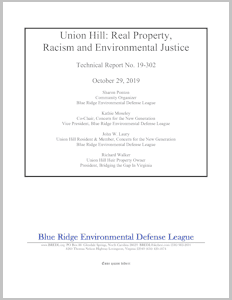Blue Ridge Environmental Defense League Board of Directors approved this policy at its 9/18/99 meeting
1. So-called low-level radioactive waste is a complex mixture of waste streams that should be dealt with separately. Radioactive wastes should not be mixed indiscriminately together, but should be separated by half-life, decay energy, mobility, and potential for biological uptake. In general, the separated waste streams should be dealt with differently.
2. North Carolina should not attempt to deal with all wastes at one stroke, in a single facility, and by a single method. Short-lived medical wastes can be stored to decay. Reactor wastes, including decommissioning wastes, pose a long-term problem of national character and may ultimately require deep geological storage.
3. In seeking to determine how wastes should be handled, North Carolina should concentrate first on wastes produced under state license. It may be more appropriate to regard wastes produced under federal license as a federal, rather than a state or local, responsibility.
4. North Carolinians must be protected from the risks associated with potentially inadequate regulatory oversight. The state must insist on its ability to set stricter than federal standards. In addition, citizens should have the statutory right to use citizens suits to force licensee compliance with radiological standards, when regulatory oversight is inadequate.
5. Dilution and/or release, including sanitary sewer disposal or incineration, are generally inappropriate methods for handling radioactive waste.
6. Disposal options alone cannot solve the radioactive waste problem. Minimization of produced waste volumes and activities is essential for long-term solutions. North Carolina should adopt a state policy opposing activities which increase radioactive waste volume or hazard. For example, under such a policy the state should officially oppose the use of plutonium fuels in nuclear reactors, since plutonium fuel use would increase the hazard and volume of expected radioactive wastes.
7. Any effective state policy must include disincentives for waste production. An effective state policy could include incentives, such as time-limited tax credits, for development and permanent adoption of technologies and processes which do not produce radioactive waste.
8. Any radioactive waste treatment or disposal facilities licensed by the state must isolate the waste for the full hazardous life of the waste. Legislation implementing the state policy should establish that users of such waste treatment or disposal facilities retain title to the waste and remain jointly and severally liable for environmental effects of the facility. Legislation implementing the state policy should further establish a rebuttable presumption that the operator and users of radioactive waste treatment or disposal facilities are responsible for radioactive contamination within five miles of the facility and of transportation routes to the facility: that is, near waste treatment or disposal facilities. Courts would presume that the operator and users were responsible for any radioactive contamination, unless the operator and users could prove otherwise.
9. The costs of radioactive waste treatment or disposal, and the cost of any radioactive treatment or disposal facility, are primarily the responsibility of radioactive waste generators and, as such, should be borne by the generators. North Carolina taxpayers are not responsible for providing relief to waste generators. Regulatory agency fees should be high enough to cover reasonably expected inspection costs. Violation of state license conditions should result in required posting of a secure bond; repeat violations should result in loss of state license.
10. Consistent with the above objectives, North Carolina should not license any facilities with the potential to become regional, multi-state, or national disposal sites. North Carolina policy should not allow waste generators to import waste from other states for disposal.
 Buckingham, VA – Today Blue Ridge Environmental Defense League and its Buckingham Chapter, Concern for the New Generation, released a new report: “Union Hill: Real Property, Racism and Environmental Justice,” which reveals a history of subversive policies, in Virginia and nationwide, which severely limit the ability for African Americans to build wealth.
Buckingham, VA – Today Blue Ridge Environmental Defense League and its Buckingham Chapter, Concern for the New Generation, released a new report: “Union Hill: Real Property, Racism and Environmental Justice,” which reveals a history of subversive policies, in Virginia and nationwide, which severely limit the ability for African Americans to build wealth.
